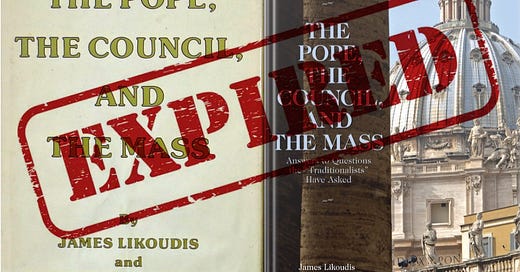Likoudis to the Rescue? On the Flaws of an Old Conservative Warhorse
Why "The Pope, the Council, and the Mass" is useless as a current resource
The Pope, the Council, and the Mass: Answers to Questions the “Traditionalists” Have Asked by James Likoudis and Kenneth Whitehead, was first published in 1981; a revised edition appeared in 2006.
Mr. Likoudis passed away only this past September 3; Mr. Whitehead passed away in 2015. Requiescant in pace. Both men did a lot of good work for the Church. (“Warhorse” in this article’s title refers to the above-mentioned book, not to either of the authors!)
The book in question once exercised a strong influence on me in my initial conservative phase (late 80s, early 90s) — before I discovered how rife it was with errors, misinformation, and frankly inadequate analysis.
For starters, as I recall, they run with the view that the “Tridentine Mass” is about 400 years old and that St. Hippolytus is the origin of Eucharistic Prayer II. Both claims are as historically false as the day is long. On the former, Joseph Shaw’s short article is sufficient to clear up the confusion on St. Pius V. On the latter, if I might sum up Fr. John F. Baldovin’s scholarly demonstration, we should get used to calling the base text “the pseudo-Roman pseudo-anaphora of pseudo-Hippolytus.” One will find nowhere in the pages of Likoudis-Whitehead the kind of cutting-edge research Matthew Hazell has done, who proved in detail that only 13% of the prayers of the old Roman missal were carried over intact into the new missal (so much for “continuity”).
If I could sum up my reservations in a sentence: a lot of water has gone under the bridge since this book first appeared, and our situation now is much more dire. No amount of padding will be able to change the fact that the traditionalist critique of the liturgical reform — which has become a familiar feature of the landscape via such figures as Klaus Gamber, Joseph Ratzinger, Alcuin Reid, Lauren Pristas, Michael Fiedrowicz, Uwe Michael Lang, Stefan Heid, Michael Foley, Gregory DiPippo, myself, and many others, and which has won the respect, if not the agreement, of a broad range of figures — has fundamentally reoriented the discussion.
It is simply no longer credible to proceed as if (a) the pope has absolute authority over all things liturgical save a neoscholastic “matter and form,” (b) the reform as it happened faithfully implements Vatican II’s Sacrosanctum Concilium as understood by the Council Fathers, (c) the traditionalist response is imprudent, disrespectful, disobedient, etc. And yet all these views are hard-wired into the Likoudis-Whitehead book. The argumentation is poor, the content partial and partisan, and the theological perspective narrow.
Keep reading with a 7-day free trial
Subscribe to Tradition and Sanity to keep reading this post and get 7 days of free access to the full post archives.





